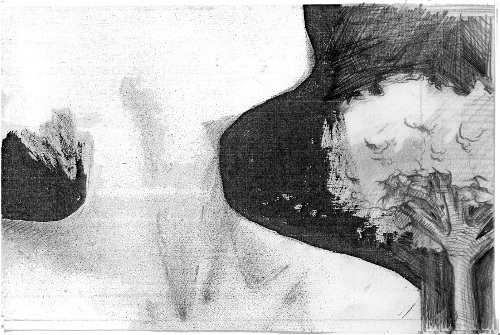Them Apples
by Deborah Crooks
illustration by Marie Rich
I grew up on five acres of land that held an oddball collection of fruit trees. Located on the outskirts of the Pajaro Valley of Santa Cruz County, we lived in a place that supplied much of the state—if not the country—with strawberries and apples. Across the road was a commercial apple orchard, and a mile from my grammar school were acres upon acres of strawberry fields. My dad did not grow any crop in high enough quantity to call it an orchard. But there were enough trees so that, each year, we could count on at least one of them producing apples, pears, cherries, walnuts, avocados, kiwis or apricots in numbers beyond our ability to consume. But some years, we were lucky to harvest one pear (they never did that well); other years we were happy to pick a handful of cherries. Dad didn’t apply much extra fertilizer or bug spray—he raised trees the same way he raised us: If something couldn’t get by on the basics, it probably wouldn’t get far in the world.
Nevertheless, we somehow made our way to adulthood and, each year, at least one of the trees would take a star turn. The year the apricot tree outside my bedroom window peaked, we did not care that the scrub jays gorged on a full third of the tree’s fruit. We made cobblers and pie, and dried the rest by laying them out on planks held up by a couple of sawhorses. The cherry tree only fruited to its full capacity once in my 18 years of living under my father’s guardianship, but our apples were stalwarts, partly because they were in ideal growing conditions, partly because we had an apple tree per acre. And if, for some reason, we were short, the orchard owner across the street would give us an extra bucketful from his well-maintained trees. In the spring, we would wake to the sounds of crop dusters flying low to spray green clouds of sulfur over the neat rows across the way. Different pesticides were applied throughout the year; as the weather warmed, we ran between the trees on our way to the creek, often passing signs emblazoned with skulls and crossbones.
By summer’s end, my dad would be hauling more bucketfuls of apples into the kitchen.
“I’ll peel if you make the pie,” he would say, and over a succession of weeks, he’d sit at the counter, twirling each piece of fruit around the blade of a knife until it was skinless, then chopping it into quarters or eights depending on its size. I would douse the fruit in cinnamon and sugar before setting about making pie dough. I turned out increasingly practiced pies with perfect crusts.
For what seemed like a couple of months, we ate pie nearly ever day.
By the time I finished high school, I contracted a thyroid tumor, right over the spot you would call my Adam’s apple. After a year or two of regular blood tests and needle biopsies that monitored its growth, the benign mass was removed, leaving a thin, barely perceptible scar. My sister would have an identical surgery five years after my own. A decade later, my father would die of a rare form of non-Hodgkin’s lymphoma. A year after his passing, my mother was diagnosed with a different form of lymphoma, passing on from the disease after a few years. My hunch is the pesticide exposure contributed to these health problems, though my parents’ doctors never said so. Instead, they spent their time scheduling chemotherapy and radiation, planning and rotating treatments like the apple farmers used to apply pesticides and fertilizers. Chemo and radiation often killed my parents’ appetites as much as it did cancerous and noncancerous cells. Applesauce was often one of the few things they could eat.
I still eat apples, though I rarely pick my own. I live in the city—there is not a fruit tree in sight of my apartment. On weekends, I pedal down to the farmers’ market, visiting every organic grower hailing from Santa Cruz County. These excursions serve as my visits “home.” I avoid thinking of how my home may or may not be living in me. Instead, I taste the apples and smell the strawberries. I ask the farmers which variety is doing best. I remember my father’s voice and the joy he took in his fruit trees. Sometimes I buy enough fruit to make a pie. No matter the sugar content, I always find them bittersweet.
Deborah Crooks (deborahcrooks.com) is a San Francisco based writer and singer/songwriter.
